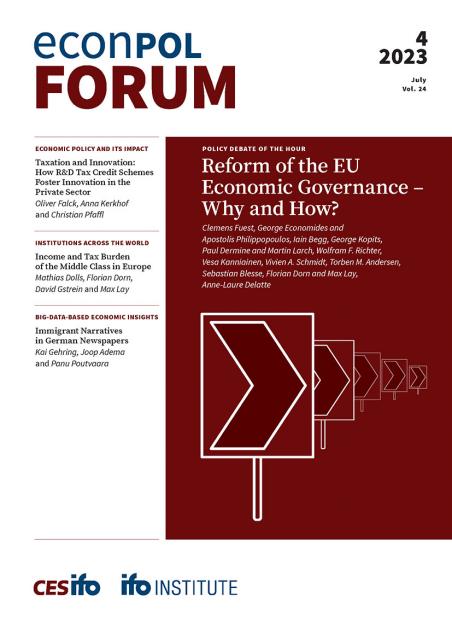Reform of the EU Economic Governance – Why and How?
POLICY DEBATE OF THE HOUR
Articles included
POLICY DEBATE OF THE HOUR
Introduction to the Issue on Reform of the EU Economic Governance – Why and How?
Chang Woon Nam
EconPol Forum 24 (4), 03-04
The Reform of the EU Economic Governance Framework, Market Discipline and the Role of the ECB
Clemens Fuest
EconPol Forum 24 (4), 05-10
Fiscal Sustainability: Interest Rates, Growth and Debt-based Policy Rules
George Economides and Apostolis Philippopoulos
EconPol Forum 24 (4), 11-15
The EU’s Increasingly Complex Finances: A Ticking Bomb?
Iain Begg
EconPol Forum 24 (4), 16-20
EU Fiscal Rules: Do They Destabilize and Inhibit Economic Activity?
George Kopits
EconPol Forum 24 (4), 21-25
Solving the Enforcement Dilemma of the EU Fiscal Rules
Paul Dermine and Martin Larch
EconPol Forum 24 (4), 26-29
Rewarding Compliance with Fiscal Rules - A Proposal for Reform of the Stability and Growth Pact
Wolfram F. Richter
EconPol Forum 24 (4), 30-33
Making the Eurozone Function Again: A Solution for the European Debt Problem Is Hard But Not Impossible
Vesa Kanniainen
EconPol Forum 24 (4), 34-37
Making EU Economic Governance Fit for Purpose: Investing in the Future and Reforming the Fiscal Rules While Decentralizing and Democratizing
Vivien A. Schmidt
EconPol Forum 24 (4), 38-44
Public Investments: Is There a Golden Rule Separating “Good” from “Bad” Debt?
Torben M. Andersen
EconPol Forum 24 (4), 45-48
Reforming EU Fiscal Governance: A Golden Rule for Public Investments?
Sebastian Blesse, Florian Dorn and Max Lay
EconPol Forum 24 (4), 49-56
EU Economic Governance and the Climate Crisis
Anne-Laure Delatte
EconPol Forum 24 (4), 57-60
ECONOMIC POLICY AND ITS IMPACT
Taxation and Innovation: How R&D Tax Credit Schemes Foster Innovation in the Private Sector
Oliver Falck, Anna Kerkhof and Christian Pfaffl
EconPol Forum 24 (4), 61-66
INSTITUTIONS ACROSS THE WORLD
Income and Tax Burden of the Middle Class in Europe
Mathias Dolls, Florian Dorn, David Gstrein and Max Lay
EconPol Forum 24 (4), 67-72
BIG DATA-BASED ECONOMIC INSIGHTS
Immigrant Narratives in German Newspapers
Kai Gehring, Joop Adema and Panu Poutvaara
EconPol Forum 24 (4), 73-77
Europe is facing a whole new set of challenges: The cost of living is rising, war is on our doorstep, and an environmental turnaround is needed. How should the EU framework for economic governance change to make Europe stronger, more sustainable and more resilient? The European Commission has recently developed guidelines for a reformed economic governance framework. In March 2023, the European Council endorsed these guidelines. They aim at strengthening national ownership and facilitating the enforcement of projects. At the same time, they are intended to enable strategic investments and set a framework to reduce the high level of public debt. However, such economic policy coordination efforts at the EU level and the individual governance reform proposals open new debates. To what extent do they correspond to the real needs and interests of the EU? And do they take into account country-specific economic, structural and social problems of the member states?
The articles in this issue of EconPol Forum highlight important aspects of a reform of the EU’s economic governance that will help to make the public finance and the economy of the EU and its member states healthier and more resilient in the future. They critically examine the EU’s latest reform proposal and shed light on ways to make policies and measures more effective.
“Reform of the EU Economic Governance – Why and How?,” EconPol Forum 24 (4), CESifo, Munich, 2023.
